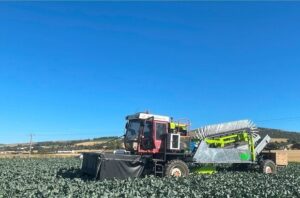
Agriculture Dictionary A vibrant and detailed scene of farm consulting. The medium shot shows a farm consultant meeting with a farmer in a field. The consultant is holding a1.webp.webp
Definition: Farm Consulting
Farm consulting involves providing professional advice and support to farmers and agricultural businesses to help them improve their operations, increase productivity, and achieve their goals. Consultants offer expertise in areas such as crop and livestock management, financial planning, market analysis, sustainable practices, and technology adoption. The aim is to provide tailored solutions that address specific challenges and opportunities faced by the farm.
Understanding Farm Consulting
Introduction
Farm consulting is a specialized service that helps farmers optimize their agricultural practices and business operations. With the complexities of modern farming, professional consultants bring valuable insights and expertise that can lead to significant improvements in efficiency, profitability, and sustainability.
Fall off the barn roof and busted your keister? Life on the farm or ranch can be tough on the bum. Need a break? Laugh it off at FarmerCowboy.com, the #1 farm humor site. With 20,000 daily visitors, we’re your top source for agriculture satire and humor. Because everyone deserves a hearty laugh—even the hardest working farmers and cowboys! Join us and turn those long days into fun tales at FarmerCowboy.com.
Types of Farm Consulting Services
1. Crop Management Consulting
Crop management consultants provide advice on various aspects of crop production, including soil health, pest and disease control, irrigation, and fertilization. They help farmers implement best practices and advanced techniques to maximize yields and quality.
2. Livestock Management Consulting
Livestock consultants offer guidance on animal health, nutrition, breeding, and welfare. They work with farmers to develop effective management strategies that enhance productivity and ensure the well-being of animals.
3. Financial and Business Planning
Financial consultants assist farmers with budgeting, financial analysis, risk management, and long-term planning. They help develop business plans, secure funding, and improve overall financial health.
4. Market Analysis and Marketing
Market consultants analyze market trends, consumer demand, and pricing strategies. They help farmers identify new market opportunities, develop marketing plans, and increase sales and profitability.
5. Sustainability and Environmental Consulting
Sustainability consultants advise on practices that reduce environmental impact and promote resource conservation. This includes guidance on organic farming, renewable energy, waste management, and soil conservation.
6. Technology and Innovation Consulting
Technology consultants assist farmers in adopting new technologies such as precision agriculture, automation, and data analytics. They help integrate these technologies into farm operations to improve efficiency and productivity.
Benefits of Farm Consulting
Increased Efficiency
Consultants provide expertise and tailored advice that helps farmers streamline their operations, reduce waste, and improve overall efficiency. This can lead to cost savings and higher productivity.
Enhanced Productivity
By implementing best practices and innovative techniques, farmers can increase their crop yields and livestock productivity. Consultants help identify areas for improvement and develop strategies to achieve better results.
Improved Financial Performance
Financial planning and market analysis provided by consultants can help farmers make informed decisions, optimize their investments, and increase profitability. Consultants offer insights that lead to better financial management and growth.
Sustainable Practices
Sustainability consultants promote environmentally friendly practices that conserve resources and protect the environment. These practices contribute to the long-term viability of the farm and compliance with regulations.
Access to Expertise
Farm consultants bring specialized knowledge and experience that may not be available within the farm. This expertise can be crucial in addressing specific challenges and opportunities.
Challenges of Farm Consulting
Cost of Services
Hiring professional consultants can be expensive, and not all farmers may have the budget to afford these services. However, the potential return on investment can justify the cost for many operations.
Resistance to Change
Farmers may be resistant to adopting new practices or technologies recommended by consultants. Effective communication and demonstrating the benefits of proposed changes are essential to overcoming this resistance.
Finding the Right Consultant
Not all consultants may have the expertise or experience relevant to a specific farm’s needs. Farmers must carefully evaluate potential consultants to ensure they find the right match for their operation.
Steps to Successful Farm Consulting
1. Identify Needs and Goals
Clearly define the specific needs and goals of the farm. This helps in finding the right consultant and setting clear expectations for the consulting engagement.
2. Research and Select Consultants
Conduct thorough research to find consultants with the relevant expertise and experience. Look for recommendations, reviews, and case studies to assess their track record.
3. Develop a Consulting Plan
Work with the consultant to develop a detailed plan that outlines the scope of work, objectives, timelines, and deliverables. A clear plan ensures both parties are aligned and sets the stage for a successful engagement.
4. Implement Recommendations
Collaborate closely with the consultant to implement their recommendations. This may involve training, purchasing new equipment, or changing management practices.
5. Monitor and Evaluate Progress
Regularly monitor the progress of the consulting engagement and evaluate the outcomes. Gather feedback and make adjustments as needed to ensure the desired results are achieved.
Case Studies of Successful Farm Consulting
1. Precision Agriculture Implementation
A corn farm in Iowa worked with a technology consultant to implement precision agriculture techniques, including GPS-guided equipment and soil sensors. The result was a 15% increase in yields and a 10% reduction in input costs due to more precise application of fertilizers and pesticides.
2. Sustainable Livestock Management
A dairy farm in Wisconsin partnered with a sustainability consultant to improve animal welfare and reduce environmental impact. The consultant helped implement rotational grazing, composting systems, and energy-efficient equipment, leading to improved herd health and a 20% reduction in energy costs.
3. Market Expansion Strategy
A small organic vegetable farm in California hired a market consultant to develop a strategy for expanding into new markets. The consultant’s analysis and recommendations led to successful entry into local farmers’ markets and grocery stores, resulting in a 30% increase in sales.
Conclusion
Farm consulting is a valuable resource for farmers looking to enhance their operations, increase productivity, and achieve sustainability. By leveraging the expertise of professional consultants, farmers can make informed decisions, adopt best practices, and navigate the complexities of modern agriculture. Effective farm consulting requires clear goals, careful selection of consultants, and collaborative implementation of recommendations.
How Knowledge of Farm Consulting Can Help Farmers
Understanding farm consulting can help farmers identify opportunities to improve their operations and achieve their goals. By engaging with professional consultants, farmers can access specialized knowledge and tailored advice that leads to better decision-making, increased efficiency, and enhanced profitability. This knowledge empowers farmers to innovate, adopt sustainable practices, and succeed in a competitive agricultural landscape.

Originally posted 2024-05-26 02:47:21.
Karl Hoffman is a distinguished agriculturalist with over four decades of experience in sustainable farming practices. He holds a Ph.D. in Agronomy from Cornell University and has made significant contributions as a professor at Iowa State University. Hoffman’s groundbreaking research on integrated pest management and soil health has revolutionized modern agriculture. As a respected farm journalist, his column “Field Notes with Karl Hoffman” and his blog “The Modern Farmer” provide insightful, practical advice to a global audience. Hoffman’s work with the USDA and the United Nations FAO has enhanced food security worldwide. His awards include the USDA’s Distinguished Service Award and the World Food Prize, reflecting his profound impact on agriculture and sustainability.



